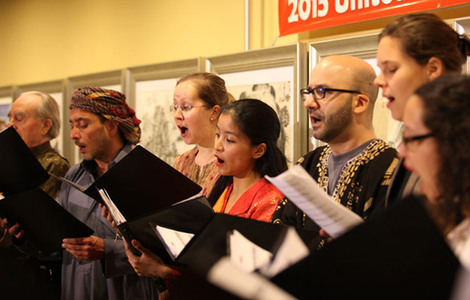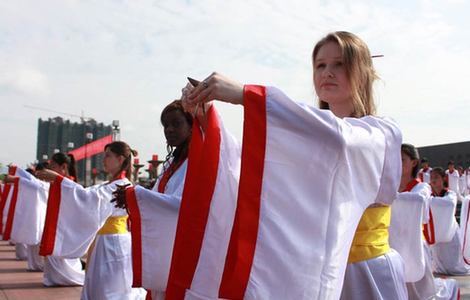Sino-US military engagement, cooperation
Updated: 2015-04-22 11:44
By Jerome Sibayan and Michael Marra(China Daily USA)
|
||||||||
Because complexity inhibits flexibility, early choices are especially crucial," says Henry Kissinger in his book Diplomacy.
The calls for military-to-military engagement between the United States and China have been made by leaders of both nations since China's opening in 1978. As the challenge from the Soviet Union passed in 1991, the two countries have cooperated greatly in the economic realm, but some distance has appeared between the People's Liberation Army (PLA) and the US military. We suggest that military-to-military engagements are not only possible, but are likely to produce mutual understanding and reduce the chances of misunderstanding that could lead to conflict.
This article describes some of the engagements between the Defense Attachs Office in the embassy of the People's Republic of China in Washington, and the United States Army War College in Carlisle, Pennsylvania. We conclude with some personal observations and recommend some future engagement opportunities.
|
Xu Nanfeng, the military attache at the Chinese Embassy in Washington, speaks about China-US military cooperation and peace and stability in the Asia Pacific region during an event at the US Army War College in Pennsylvania in December 2012. Provided to China Daily |
China's embassy and the US Army War College (USAWC) are separated by slightly more than 100 miles. The Chinese embassy's mission is to promote cooperation with the US resulting in long-term, stable relations. The Defense Attach is Major General Xu Nanfeng, who leads a joint attach team of senior People's Liberation Army, Navy, and Air Force officers.
The US Army War College's mission is to educate and develop leaders for service at the strategic level while advancing knowledge in the global application of Landpower. The institution, which is the final school in an Army officer's professional military education, envisions producing strategic leaders and ideas invaluable to the Army and the nation. The commandant is Major General William Rapp who leads the School of Strategic Landpower, the Strategic Studies Institute and the Center for Strategic Leadership & Development.
Our personal involvement in military-to-military engagement between the PLA and the US Army came in the summer of 2011 when the Chinese Defense Attach provided the USAWC with the opportunity to bring a small group of students to the Chinese embassy for a two-hour visit.
Lieutenant Colonel Sibayan contacted Senior Colonel Shang Hong to arrange the visit and the details were quickly agreed to. The students and Sibayan arrived at the Chinese embassy and were treated to a tour of the embassy designed by the world famous Chinese-American architect I.M. Pei. Following the tour, members of the PLA Defense Attach's Office and the USAWC students convened in a beautiful conference room and discussed our different perspectives of regional security and the challenges each country faces. In every year since, the annual USAWC visit to the Chinese embassy has become a valuable venue for candid dialogue about the security environment facing both countries.
In December 2013, Major General Xu Nanfeng came to the US Army War College to meet with the commandant and directly address the resident students and faculty, to include nearly 80 international fellows. Although PLA officer visits are relatively rare, they are always enthusiastically welcomed to Carlisle Barracks. His presentation on Strengthening Military Cooperation was the first time in several years such a high-ranking officer from the PLA dialogued with US Army War College officers and senior civilians from all over the globe. The exchange was open, candid and extremely beneficial for all in attendance.
In March 2014, a delegation led by the Chinese Academy of Military Science spent three days at the US Army War College and engaged in very candid and wide-ranging dialogue. The exchange featured facilitated panel discussions involving 20 highly-qualified American and Chinese panel members from the Chinese Academy of Military Science, the PLA Naval Research Institute, the Nanjing Army Command and Staff College, the PLA National Defense University, the US-China Economic and Security Review Commission, the National Bureau of Asian Research, RAND, the US Defense Intelligence Agency, the Department of the Army Headquarters, and the USAWC Strategic Studies Institute. Participants also had the opportunity to ask questions and elicit responses from panel members following their presentations.
In November 2014, a group of mid-level officers, ranks ranging from majors to senior colonels, visiting the United States as part of framework of cooperation set forth between the heads of the two nations, had an opportunity to meet with a seminar of resident students representing all military services and several allied nations. Both sides had an opportunity to candidly interact with each other and learn about the US professional military education system, areas of potential cooperative security and possible frameworks to avoid miscalculation or inadvertent military escalation.
These engagement opportunities demonstrate that senior military officers of our two great nations are able to work toward global and regional peace and security through open and frank discourse. It is important to keep in mind that although the participants in these engagements are not necessarily strategic leaders and decision makers, they are advising strategic leaders and therefore the impact of experiencing cooperation and collegiality is absolutely clear. While both sides do not always see security challenges through the same lens, it is possible to appreciate the perspectives of other military professionals. Knowing that regular communication is possible enables us to avoid misperceptions and miscalculations.
Over the years, and especially the last two to three years, the PLA and the US Army War College have discovered ways to open the dialogue between our respective armies to build a productive relationship. This relationship is founded on mutual respect, which will lead to improved mutual understanding and trust. We acknowledge we have work ahead in the area of cultivating this relationship, especially between our military forces, but our aspiration is to invest in our future leaders now, at places like the US Army War College and, where we influence not only officers from the US, but from nearly 80 nations. It is our vision that in times of future friction and crisis, there is a strong relationship that will underpin wise judgment and decisions at all levels.
The authors are Lieutenant Colonel Jerome Sibayan and Colonel (Retired) USAF Michael Marra. Both are faculty members at the US Army War College. Their comments and views are their own and do not necessarily reflect those of the US Army or the US Department of Defense.
(China Daily USA 04/22/2015 page12)

 Chinese real estate deals in US topical forum
Chinese real estate deals in US topical forum
 Singing Chinese language's praises
Singing Chinese language's praises
 Foreign girls join in ancient Chinese coming-of-age ritual
Foreign girls join in ancient Chinese coming-of-age ritual
 Shanghai auto show kicks off
Shanghai auto show kicks off
 Annual Tweed Run held in central London
Annual Tweed Run held in central London
 Wood sculptures discovered inside cliffside cave in Chongqing
Wood sculptures discovered inside cliffside cave in Chongqing
 Antiriot device earns national patent for Jilin farmer
Antiriot device earns national patent for Jilin farmer
 7 trends that will shape China's supply chain
7 trends that will shape China's supply chain
Most Viewed
Editor's Picks

|

|

|

|

|

|
Today's Top News
Bloomberg: Chinese investment sustains US cities
China, Pakistan elevate ties, commit to long-lasting friendship
'Belt-Road' to exchange goodwill with economic coopertation
Swarm of Chinese applications deplete US investor visas
AIIB looks to be efficient and 'green'
Basketball star says he has Beijing in his heart
Bridging cultures with laughter
and song
Central bank cuts ratio for reserves
US Weekly

|

|







